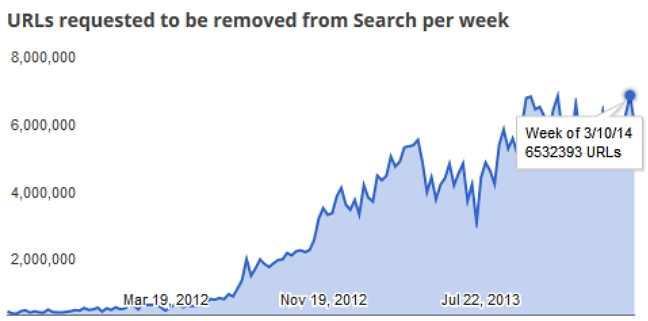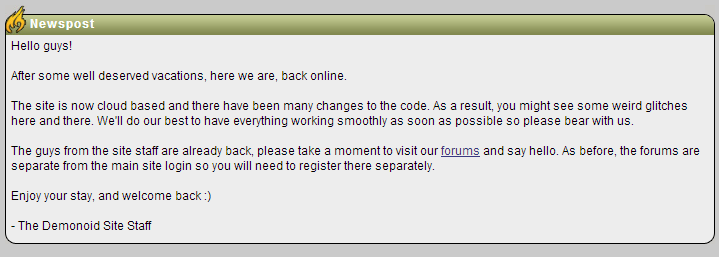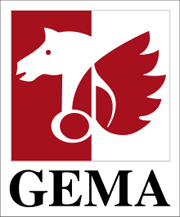TorrentFreak Email Update |
- Pirate Bay Partners With Neuroscientists to Launch “Virtual Bay”
- UK Police Launch Pirate Site Blacklist for Advertisers
- Top 10 Most Pirated Movies of The Week – 03/31/14
- Microsoft Censors TorrentFreak For Security Reasons
- Bad Google DMCA Takedown is Hurting Us, Hosting Site Says
| Pirate Bay Partners With Neuroscientists to Launch “Virtual Bay” Posted: 31 Mar 2014 04:00 AM PDT
“We’re about to take the biggest step in our history,” says TPB in a blog post that went out earlier than expected. In addition to changing the look of its frontpage the site has renamed itself to ‘The Virtual Bay’ to celebrate a new partnership with neuroscientists from Russia, Israel and Japan. The goal is to build a next generation virtual reality device that will change the way people interact with the site and the pirated media it offers. “As piracy is about to change from sharing of files into the sharing of everything, we’re planning our departure from this earthly form. Preparing our final ascension into the transcendence. The final conflux,” the TPB team notes. Traditional media companies are resisting change and have been slow to pick up on virtual reality, but The Pirate Bay is jumping in to fill this void. When the site’s device is ready, Pirate Bay users will be able to actively participate in the games and videos downloaded from the site. “Using a simple plugin into the brain, you will no longer only be able to see and hear a movie, a game or whatever it is you want. You’ll be able to live it. Play the main character. Tweak any story in any way you want,” TPB writes. In addition, the virtual reality component will store the entire Pirate Bay ecosystem in people’s minds, making it accessible instantaneously, faster than ever before, and impossible to shut down. In other words, the people will become The Pirate Bay and take the site to a new dimension. “Using your brain power and nervous system, we will be able to speed things up. Every part of The Pirate Bay will be stored within you and everyone else that dares to participate in this step into the future. The more we are, the faster everything will be. “Our scientists calculate that if we become at least 1,333,337 nodes, everything will be shared instantaneously,” the TPB team adds. More details about this prestigious project are expected to come out later today, or tomorrow, depending on your time zone. Stay tuned. Source: TorrentFreak, for the latest info on copyright, file-sharing and anonymous VPN services. | ||||||||||||||||||||||||||||||||||||||||||||||||
| UK Police Launch Pirate Site Blacklist for Advertisers Posted: 31 Mar 2014 12:57 AM PDT
Initially the police only sent warning letters to site owners, asking them to go legit or shut down. Late last year this was followed by a campaign targeted at domain registrars, asking them to suspend the domain names of several so-called pirate sites. Today sees the launch of the next initiative in “Operation Creative,” an official URL blacklist of “pirate sites”. The Police Intellectual Property Crime Unit (PIPCU) just launched their “Infringing Website List” (IWL) and are encouraging advertising agencies to embrace it. The main goal of the blacklist is to disrupt the revenues of infringing websites worldwide. Together with the movie and music industries the police carried out a three-month pilot which resulted in a 12% reduction of ads from major brands appearing on these sites. To what extent the blocklist will hurt total revenues is unclear though, as there are dozens of ad firms who focus on file-sharing sites, and these are unlikely to join the program. The police and their partners, however, are convinced that the blacklist will have a positive effect, not only in terms of cutting off revenue to pirate sites, but also as a tool to prevent advertisers being associated with rogue websites. "If an advert from an established brand appears on an infringing website not only does it lend the site a look of legitimacy, but inadvertently the brand and advertiser are funding online crime,” PIPCU Chief Andy Fyfe says. From the information that was made available to TF, it appears that the blacklist will not be open to the public. This is worrying, since there is a serious threat of overblocking without any public oversight. For example, in their announcement the police cite a recent report on the profitability of pirate sites. However, that report included many sites with perfectly legitimate uses, and even a purely informational website that doesn’t host or link to infringing content at all. Concerns aside, music industry group BPI is confident that the “Infringing Website List” will turn out to be another successful voluntary agreement focused on tackling online piracy. "The early results from Operation Creative show that through working with the police and the online advertising industry, we can begin to disrupt the funding that sustains illegal websites and the advertising that lends them a false air of legitimacy,” BPI’s Chief Executive Geoff Taylor says. Similarly, the Hollywood backed group FACT is also positive about the new initiative. "FACT is delighted to be working with PIPCU to deliver a unique initiative that puts the UK at the forefront of brand protection by allowing everyone in the advertising value chain to prevent misplacement of ads,” Kieron Sharp, Director General at FACT says. “For those rogue sites that continue to provide access to illegally obtained films and TV programmes there will now be affirmative action taken by PIPCU to ask them to change their operation or shut up shop,” he adds. Whether the “Infringing Website List” will indeed have a significant impact on the business of the affected sites has yet to be seen. In any case, City of London Police and the entertainment industries are determined to keep the pressure on. Update: The City of London Police confirmed to to us that the blacklist will not be made public. “All sites on IWL are identified and evidenced as infringing by rights holders and then verified by PIPCU. We are not making the IWL public. The List will be ever changing as new sites appear and older sites comply,” a City of London Police spokesperson told TF. Source: TorrentFreak, for the latest info on copyright, file-sharing and anonymous VPN services. | ||||||||||||||||||||||||||||||||||||||||||||||||
| Top 10 Most Pirated Movies of The Week – 03/31/14 Posted: 31 Mar 2014 12:00 AM PDT
The Secret Life of Walter Mitty is the most downloaded movie this week. The data for our weekly download chart is estimated by TorrentFreak, and is for informational and educational reference only. All the movies in the list are BD/DVDrips unless stated otherwise. RSS feed for the weekly movie download chart.
Source: TorrentFreak, for the latest info on copyright, file-sharing and anonymous VPN services. | ||||||||||||||||||||||||||||||||||||||||||||||||
| Microsoft Censors TorrentFreak For Security Reasons Posted: 30 Mar 2014 02:26 PM PDT
In many European countries, for example, national courts have ordered ISPs to block access to sites such as The Pirate Bay and Kickass.to. However, that’s not the only type of blocking and filtering that’s common nowadays. There are thousands of companies, schools and other organizations that voluntarily use commercial blocking software to restrict access to objectionable or threatening sites. As with all filters, however, there are false positives. TorrentFreak, for example, is often categorized as a file-sharing site, and blocked to prevent copyright infringement or other associated “threats”. Apparently this is also happening at Microsoft, where the filter managed by the local information security risk management department blocks TorrentFreak on the internal network. Microsoft employees who try to access our site are welcomed with the following message. “The requested resource has been blocked as an identified risk to your client and the Microsoft corporate network.”  The notice shows that TorrentFreak is blocked under the “peer-to-peer file sharing” category. A false positive, of course, and one that results in a form of overblocking many perfectly secure and legitimate sites are suffering from. Unfortunately the issues above are not limited to Microsoft. Every other week we are notified by readers who can't access TorrentFreak since it's blocked at their work or school because the site is classified as a source of illegal file-sharing. More often than not we're collateral damage. Just a few weeks ago we learned that the UK ISP Sky blocked TorrentFreak for all subscribers who turned on their “porn” filter. After the BBC got involved the block was eventually lifted, but other sites may not be so lucky. If anything, the above shows that these filtering systems can cause harm to legitimate sites, and the people responsible should be called out for it. TorrentFreak reached out to Microsoft to ask for a comment, but thus far without any luck. Source: TorrentFreak, for the latest info on copyright, file-sharing and anonymous VPN services. | ||||||||||||||||||||||||||||||||||||||||||||||||
| Bad Google DMCA Takedown is Hurting Us, Hosting Site Says Posted: 30 Mar 2014 10:42 AM PDT As revealed in a report earlier this week, DMCA takedown notices issued to Google have surged 711,887 percent in just four years. In fact, this month saw a new record week for notices received by the search engine. In a seven day period starting March 10, Google processed an amazing 6,532,393 notices, sent mainly by the music and adult industries.  While the majority of these notices are precise, there are some serious inaccuracies. Google does a pretty good job of rejecting many that are sent in error but it’s inevitable that some slip through the net, and when they do sites can suffer. One of the latest sites to get on the wrong end of an overbroad notice is UpToBox, a file-hosting service with millions of visitors each month. Particularly popular with the French, the site is France’s 191st most-visited site. On March 25, anti-piracy company Piracy Stops Here LLC sent a notice on behalf of adult movie company Jim Weathers Productions, asking for more than a thousand URLs to be removed from Google’s search results. All of them were specific URLs, except one – UptoBox’s homepage at UptoBox.com.  Despite zero infringing content appearing on the file-hosting site’s homepage, Google subsequently de-listed the site. On Friday, French news site Numerama contacted Google to find out whether there had been a mistake or whether removing the homepage was intentional, but received no response.  Speaking with TorrentFreak, UpToBox operator ‘Guillaume’ says despite contacting Google several times in the past few days, no one from the company has responded to their requests for an explanation. “We have sent a notice to Google to cancel this decision some days ago, without any reply from them,” Guillaume explains. “We will continue to send a notice everyday to get us put back in the search engine.” Guillaume says the cost to his site is already high. Thousands of people have failed to find the site as they might do ordinarily and as a result UptoBox has lost “a huge quantity” of new members. So, could there be unusual circumstances which would explain the complete de-listing of the site? To find out, we asked Guillaume how the site responds to copyright complaints. “We analyze them one by one, to see if notices are legal, and if files are really copyright infringing. We have received some DMCA notices about legal files in the past, so now we analyze everything,” he explains. “We delete an infringing file quickly when we received the notification, usually in 24 to 48 hours.” So for now the UptoBox homepage remains delisted by Google with no idea of when, if ever, it will be restored. The big question now is whether Piracy Stops Here knew what they were doing when they sent the notice or if it was a genuine mistake. That said, with no punishments available for those who send bad notices, nothing can be done against them anyway, a problem raised by WordPress owners Automattic earlier this month. Update: Good new for UptoBox, as the homepage has now been reinstated. Source: TorrentFreak, for the latest info on copyright, file-sharing and anonymous VPN services. | ||||||||||||||||||||||||||||||||||||||||||||||||
| You are subscribed to email updates from TorrentFreak To stop receiving these emails, you may unsubscribe now. | Email delivery powered by Google |
| Google Inc., 20 West Kinzie, Chicago IL USA 60610 | |
 The Pirate Bay has been around for more than a decade and has undergone quite a lot of change during that time. However, nothing comes close to today’s announcement.
The Pirate Bay has been around for more than a decade and has undergone quite a lot of change during that time. However, nothing comes close to today’s announcement. Over the past few months
Over the past few months 

 As the single largest semi-private BitTorrent tracker that ever existed, Demonoid offered a home to millions of file-sharers.
As the single largest semi-private BitTorrent tracker that ever existed, Demonoid offered a home to millions of file-sharers. 



 In the early days of 2013 it became clear that after years of wavering, Russia was finally going to get tough on Internet piracy. Despite outcry from Internet giants such as Google, and Yandex, the country's largest search engine, the government pressed ahead with its plans.
In the early days of 2013 it became clear that after years of wavering, Russia was finally going to get tough on Internet piracy. Despite outcry from Internet giants such as Google, and Yandex, the country's largest search engine, the government pressed ahead with its plans.

 To most consumers it is common sense that they can make a backup copy of media they own, but in the UK this is currently illegal.
To most consumers it is common sense that they can make a backup copy of media they own, but in the UK this is currently illegal. 

 Although the dream of blocking sites in the United States was completely crushed along with the now-dead SOPA legislation, music and movie companies across Europe have enjoyed a much smoother ride.
Although the dream of blocking sites in the United States was completely crushed along with the now-dead SOPA legislation, music and movie companies across Europe have enjoyed a much smoother ride.
